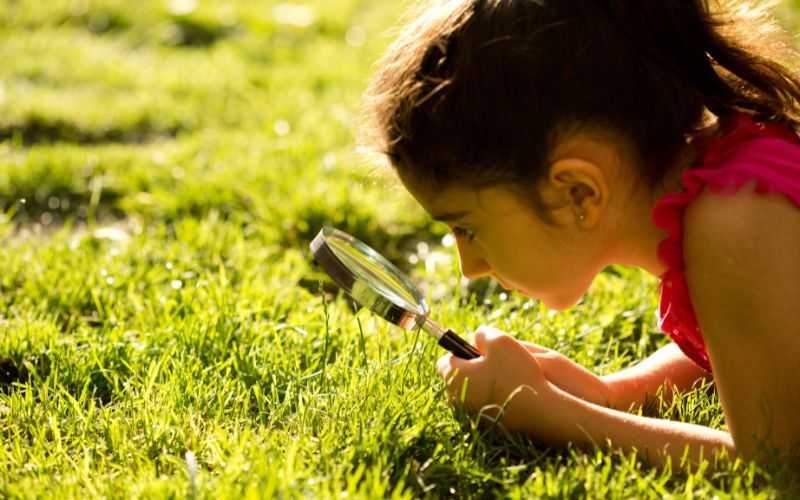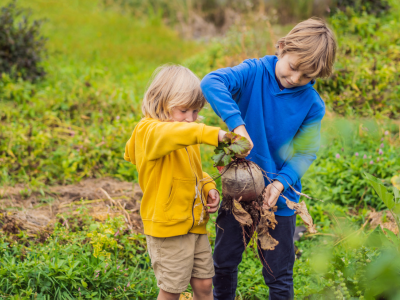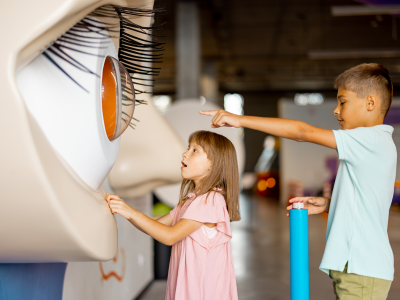What Is Unschooling?


Unschooling is an educational philosophy that encourages learning through hands-on experiences. With a focus on "natural learning", children learn and explore their own interests instead of traditional schooling methods, like following a set curriculum. This enables children to follow their own passions and interests.
Unschooling vs. traditional schooling: Pros and cons
When deciding how you’re going to teach your child, it’s essential to think about all the pros and cons. While unschooling has its benefits, it also comes with some challenges.
Here are some pros and cons you should consider:
Pros:
- Responsibility: Children learn to take their education into their own hands and actively look to discover things.
- Adaptability: Children can try various learning methods, exploring different ways to learn.
- Creative freedom: Children can unleash their imagination without schoolwork restrictions.
- Mental health: Children can freely use their imagination and play outside for longer, which improves their well-being.
Cons:
- Parental commitment: Requires a lot of support and attention to your child's education.
- Knowledge/skills gap: As it's child-led, certain subjects like math and language arts may be overlooked but are crucial to include.
- Socialization: Lacks structured social interactions, such as team sports or group bonding, which can be valuable experiences for children.
Unschooling when your child is young can be helpful as you’ll be able to notice their natural curiosity and creativity. This will help your unschooling journey, as you’ll be able to naturally develop and adapt your style alongside your child’s growth.

Debunking myths and addressing concerns
Unschooling focuses on self-directed learning and lets kids follow their interests and passions. Unschooling means there is no fixed curriculum, schedule, or school setting. Many people have concerns about home education and the effects on a child's socialization and ability to interact with other children and society.
Let’s debunk some myths!
Myth #1: Unschoolers are isolated and have no social life
People might think unschooled kids are lonely, but that's not necessarily the case. Unschooling families take part in community activities like sports, dance, volunteering, and museum or park visits. These events mean kids can socialize with peers and find mentors who share their interests.
Myth #2: Unschooling impacts a child's ability to interact with other children
There are concerns that unschooling makes kids shy, but this isn’t always true. Unschooling helps kids connect with lots of different people, growing their social skills, communication, teamwork, and respect for others. Exploring real-life situations helps them become more confident in exploring their interests.
Myth #3: Unschoolers lack structure and discipline
Unschooling is often associated with a lack of structure and discipline, but this doesn’t always apply. Unschooled children have flexible routines tailored to their personal needs. This encourages kids to be responsible for their learning and behavior. This responsibility helps create self-discipline and independence.
Myth #4: Unschooling doesn’t prepare children for the "real world"
Some people worry unschooling doesn’t prepare children for the challenges of the real world, but that’s not true. Unschooled children often develop strong critical thinking skills, and grow up to be adaptable and creative. Unschooling encourages children to be active learners and self-starters which are valuable in today’s fast-changing world.

How unschooling promotes creativity and independent thinking
This unique way of teaching kids helps their creativity and independent thinking in a variety of ways:
- Self-directed learning: Unschooling promotes self-directed learning. Students can pick what and how they learn. This freedom lets them explore, challenge themselves, and find their interests and learning styles.
- Countless learning opportunities: Unschooling encourages kids to go beyond traditional teaching methods and learning materials like workbooks, worksheets, lesson plans, and standardized tests. Instead of following a “homeschool curriculum” it focuses on hands-on experiences, community activities, and practical learning.
- Regular problem-solving: Unschooled kids can solve real-world problems on their own. Facing challenges helps them to build skills like problem-solving, decision-making, and analytical thinking that benefit them long after their schooling.
- Thinking on their own: Unschooling encourages kids to decide what, how, and when they learn, promoting self-awareness, independence, and self-reliance.
How to start unschooling: tips and resources
- Do your research: Before you start unschooling, it's important to research and learn what it includes. There are many articles and books about unschooling and how you can apply this learning style at home.
- Identify your child's interests: Unschooling is all about child-led learning. Help them discover their interests and integrate them into your daily routines.
- Create a positive learning environment: Create a learning space that excites your child. Include books, art supplies, science experiments, and online learning tools and programs.
- Trust your child: Unschooling means your child can learn at their own pace. Trust that your child will learn what they need to know.
- Find other unschoolers: Join online groups or attend homeschooling events and meetups to connect with other unschooling families. Facebook has many groups to help support and offer advice to parents wanting to start this process.
Remember, there’s no one-size-fits-all way when it comes to unschooling. You and your child can create a personalized learning experience that works for you both.
The future of unschooling: Trends, innovations, and possibilities
Unschooling is gaining popularity as parents look for different schooling options. As more parents are beginning to question traditional education, unschooling will likely be more widely accepted as a valid option.
Technology is growing and that means unschooling could include more online resources. This could help create more personalized learning experiences for kids. In the future, unschooling will keep growing and gaining acceptance, as it will enable kids to learn real-world skills in exciting ways.
How Night Zookeeper can help
Night Zookeeper makes reading & writing fantastically fun for children aged six to twelve, and it’s used by thousands of homeschoolers, unschoolers, and traditional schoolers!
Our reading & writing program covers all the language arts skills your child needs engagingly and interactively to help them learn independently and unlock their creativity! Your child will have so much fun that they won’t even realize they’re learning!
Sign up to our program today to get a free 7-day trial!
Got any questions? Reach out to us via email at [email protected], and follow us on social media:


Make Reading & Writing Fantastically Fun!
- Award-winning reading & writing program for kids
- Improves spelling, grammar, punctuation & vocabulary
- Over 1,000 different learning games and activities


The Best Homeschooling Tips for Parents


How To Homeschool Language Arts


Homeschool vs Unschool vs Gameschool


